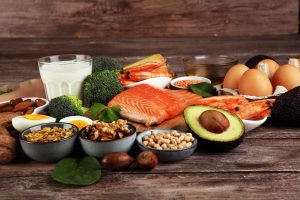Good Eating Habits for Your Vascular System

Our diet has a direct influence not only on the way we look and the way we feel in our body, but also on the health of the body’s various systems, including the vascular system. Also called the circulatory system, the human vascular system consists of a complex network of smaller and larger vessels that transport the blood and the lymph throughout the body, delivering oxygen-rich blood and nutrients to the cells in the body and taking away waste materials from the cells.
The vascular system is robust, but its health is largely and directly influenced by our eating habits. A diet that contains lots of unhealthy fats and sugars can lead to vascular problems by reducing the flexibility of the blood vessels and by causing deposits to appear on the walls of the vessels, while a diet that contains only the right nutrients can promote the health of the blood vessels and with it, the health of all the organs in the body. Here are some things to know about eating habits that are good for your vascular system.
Consume Fruits and Vegetables Every Day
Fresh fruits and vegetables are among the strongest and usually the first recommendations of any nutrition specialist when it comes to promoting vascular health through a healthy diet. Both fruits and vegetables are rich in nutrients, especially in dietary fiber, so important for gastrointestinal health. Fruits and vegetables can give the body the nutrients it needs for healthy functioning without bringing in any unhealthy fats or sugars, so they are essential components in any healthy diet.
The Importance of Proteins
A respected vascular surgeon Kansas City healthcare provider affirms that consuming healthy amounts of proteins, preferably coming from vegetable sources or from meat varieties other than red meat is also essential for vascular health. Proteins being the building blocks of any cell in the body, having a healthy intake will ensure that the cells in the blood vessels will function at optimal levels. The best sources of proteins include poultry, fish, dairy, beans and avocados.
Foods to Avoid
If we are talking about the diet that is good for your vascular health, we must talk not only about the ingredients to include in your diet, but also about what to avoid. The two ingredients that are generally considered to be the most harmful for vascular health are refined sugars and salt consumed in quantities that are too high. The body surely needs some sugar and salt, but the sugar should come from fruits, rather than from cubes of refined white sugar, and the salt intake also needs to be kept under control.
Other foods and ingredients to avoid include those that increase cholesterol levels in the blood, thus promoting the accumulation of fatty deposits in the blood vessels. Some examples of that type of ingredients include saturated fats, such as the hydrogenated vegetable oils used so commonly for cooking as well as high-fat foods, especially fast foods and processed foods. Refined carbohydrates, such as the carbs found in pastry and regular pasta are also harmful not only by increasing body weight, but also by promoting inflammatory processes in the body – processes that reduce the flexibility of the blood vessels over time.